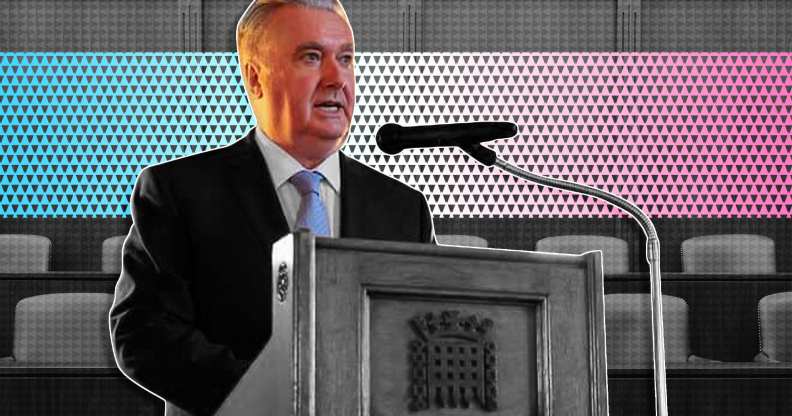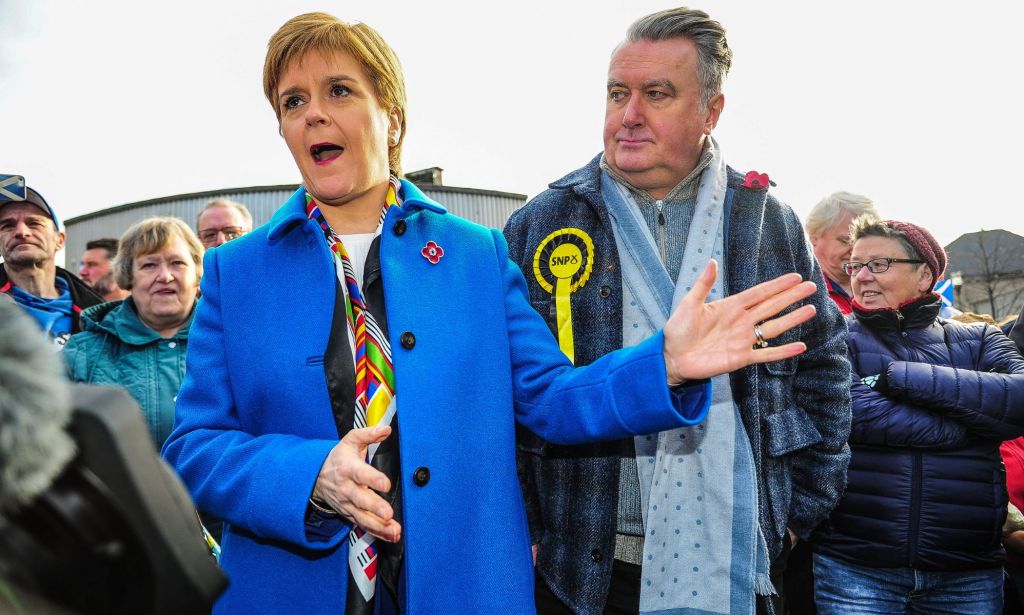Tories blocking Scottish gender reform bill is ‘constitutional outrage’, SNP’s John Nicolson says

MP John Nicolson. (Getty)
SNP MP John Nicolson says Westminster blocking Scotland’s gender recognition reform is the result of the UK government’s “culture war” against “vulnerable” trans people.
Alister Jack, the Scottish secretary, confirmed on Monday (16 January) that he will use a Section 35 order block the Scottish government’s Gender Recognition Reform Bill from becoming law in an unprecedented move in British politics.
The bill sought to simplify the process by which a trans person obtains a gender recognition certificate – a document which can be used to change the gender marker on a person’s birth certificate, and allows their correct gender to be recorded on marriage, civil partnership and death certificates. It would do this by removing the requirement of a medical diagnosis and by lowering the age limit to 16, among other things.
Speaking just before the announcement was made, SNP politician John Nicolson, one of parliament’s most well-known LGBTQ+ MPs, told PinkNews that blocking the bill would be a “constitutional outrage”.
“In any functioning democracy, which obviously the UK is not, you would expect the parliament of a country to be able to pass laws without interference from an outside body – and yet, that is what Westminster seeks to do,” he said.
Nicolson said the process to pass the gender reform bill had been “going on for literally years” and had “overwhelming support” across parties in Scotland. The bill passed 86-39, with a majority of Scottish Tories and a minority of SNP MSPs opposing.
A Section 35 order has never before been sought by the Westminster government.
“It seeks, for the first time since the introduction of devolution and the return of the Scottish parliament, to overrule the Scottish parliament on law,” Nicolson added.
“So bluntly Westminster is saying: ‘We don’t care what the Scottish parliament decides. We are in charge. We will decide what you can and cannot pass in your parliament.’
“It is a constitutional outrage.”

Nicolson said such a decision can’t be allowed to stand because Holyrood has to be the “ultimate voice of the Scottish people because we live in a parliamentary democracy”.
He accused the Tory government of seeing trans people as a “vulnerable minority” that they can use as “part of their imported culture wars”, referring to the apparent adoption of US anti-trans rhetoric.
“Trans people have been put through enough,” Nicolson added.
“Trans people have a tough enough life at the best of times, and then they’ve been subjected to the very nasty transphobic attacks that have been experienced – both literally and metaphorically – in the streets, in the newspapers, on TV programmes, on the airwaves.
“And just when they thought they’d finally get a bit of peace because the legislation had been passed – they now find that in this immensely, cowardly way, of all the pieces of legislation that a British prime minister could have chosen to attack from Holyrood over the decades, all of the social justice legislation that Holyrood passed over the years that Westminster hated, this is the first time that they’ve chosen to try and overrule a piece of Holyrood law.”
Announcing the move to block Scotland’s gender reform bill, Alister Jack claimed it would have “adverse impact” the “operation of Great Britain-wide equalities legislation”.
This is despite politicians and experts stating on a number of times that the bill would not interfere with the UK Equality Act.
Equalities minister Kemi Badenoch had already announced plans to review the list of accepted overseas gender recognition certificates, a move that appeared to have been triggered by the Scottish bill’s passing.
Nicolson noted that Britain has recognised trans people from Ireland and other countries that have similar streamlined GRC processes for years.
“They’re also going to have to go after trans people who’ve been living peaceful lives for all these years in England, covered by covered by gender recognition certificates from their own jurisdictions,” he added, calling it “particularly malevolent”.
The Tory government has opposed the Scottish bill since before its passing. Over the weekend, Labour leader Keir Starmer also voiced his opposition, despite having previously said Labour would support UK-wide reforms to the Gender Recognition Act.
Starmer stopped short of backing the challenge to the Holyrood legislation but he voiced “concerns” about reforms to the process and said he believes 16-year-olds are too young to change their legally recognised gender.

Nicolson accused the Labour leader of taking the decision for “narrow party political reasons”, adding that it is “enormously patronising” to say teenagers don’t know their gender identity.
“It directly echoes the sort of rubbish we heard in the 70s and 80s from people who told me as a gay man that at 16 I didn’t know whether I was heterosexual or homosexual and needed more time,” he said.
“No, I didn’t. I knew that I was, and it’s not up to Keir Starmer or anybody else to tell 16-year-olds whether they’re male or female.”

